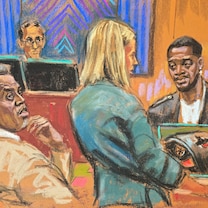Obama's VP Screener Missed Problems with Controversial Clinton Pardons
Eric Holder said he failed to focus on controversial pardon of Marc Rich.
June 20, 2008 — -- As a top official in the Clinton Justice Department, Eric Holder, one of the people chosen by Sen. Barack Obama to help screen possible vice presidential candidates, failed, by his own admission, "to focus" on the controversial pardon issued by President Bill Clinton to fugitive financier Marc Rich.
In testimony before Congress in 2001, reviewed by ABC News, Holder conceded 'some bells should have gone off, some lights should have gone on" in his vetting process then.
Holder, now a lawyer in private practice, is one of three people selected by Obama to screen and vet possible running mates, looking for possible problems that could arise.
One of the three, Jim Johnson, resigned the post after questions were raised about favorable mortgages he received from a sub-prime lender, Countrywide Financial.
Holder, as the number two person in the Clinton Justice Department, oversaw pardon recommendations to the President.
Critics of the Clinton pardons said that the department's handling of the pardon process, under Holder, broke down in the waning days of the Clinton Administration.
Sen. John McCain (R-AZ) has sought to make Holder's role in the pardons controversy a campaign issue.
At the congressional hearings, Holder testified that he regretted not paying more attention to the pardon process as it unfolded, and failing to foresee possible controversy.
"If I'd known, obviously, that it was going to turn out this way, I mean, I certainly would have done things differently," he said in response to a question about the pardon of Rich.
'I wish that I had assured that the Department of Justice was more fully informed and involved in this pardon process," he testified.
Holder said he paid less attention than he should have because he never thought the Rich pardon would actually go through.
Asked about the Rich pardon by the White House at the time, Holder said he was "neutral to leaning towards favorable if there are positive foreign policy implications that I don't know about."





